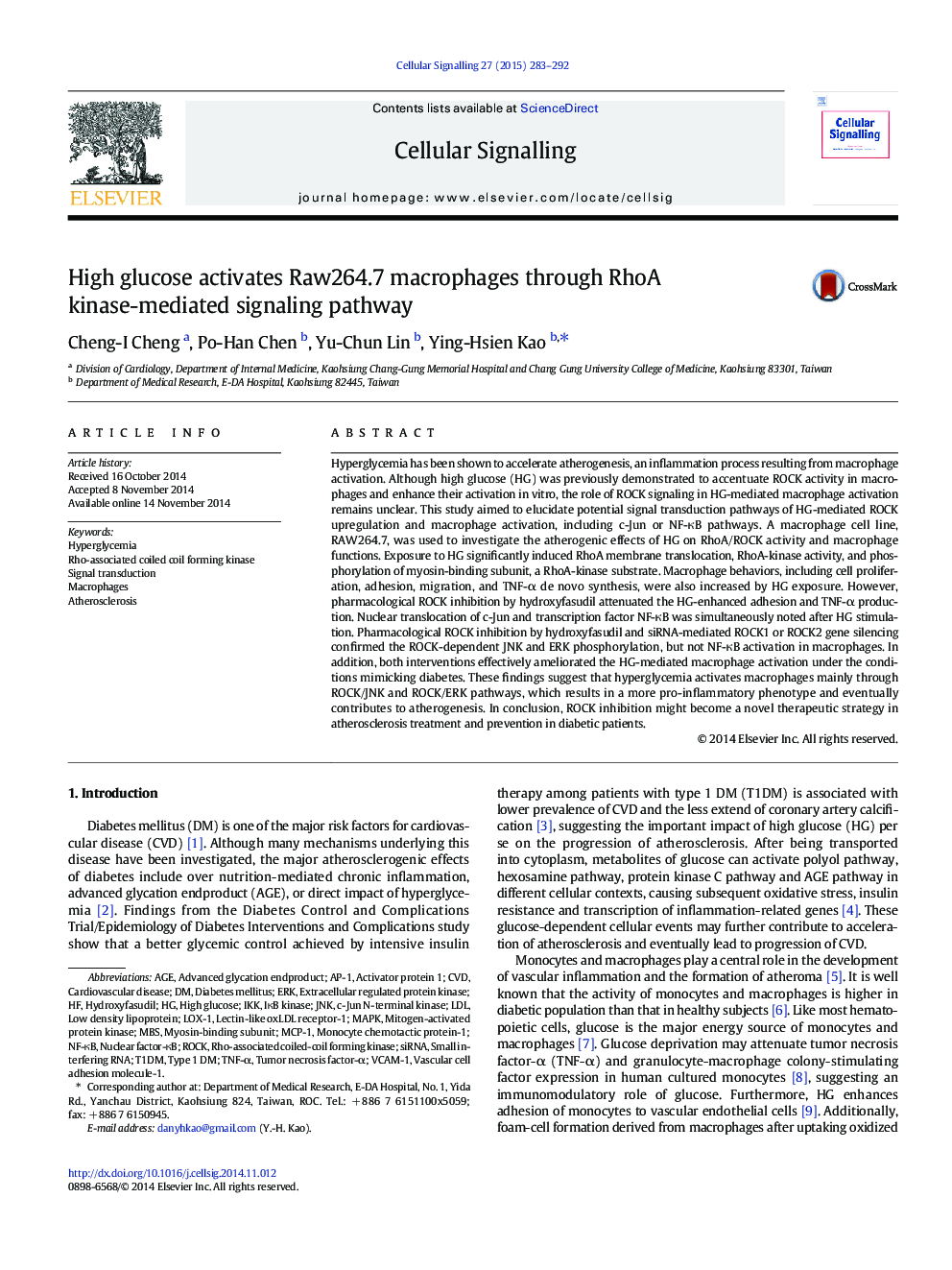| کد مقاله | کد نشریه | سال انتشار | مقاله انگلیسی | نسخه تمام متن |
|---|---|---|---|---|
| 10814875 | 1058428 | 2015 | 10 صفحه PDF | دانلود رایگان |
عنوان انگلیسی مقاله ISI
High glucose activates Raw264.7 macrophages through RhoA kinase-mediated signaling pathway
دانلود مقاله + سفارش ترجمه
دانلود مقاله ISI انگلیسی
رایگان برای ایرانیان
کلمات کلیدی
Type 1 DMLOX-1NF-κBVCAM-1T1DMMBSJnkIKKAP-1MCP-1ERKc-Jun N-terminal kinase - C-Jun N-terminal kinaseIκB kinase - IkB kinaseMAPK - MAPKSmall interfering RNA - RNA تداخل کوچکsiRNA - siRNAAtherosclerosis - آترواسکلروز(تصلب شریان)cardiovascular disease - بیماری قلب و عروقیtumor necrosis factor-α - تومور نکروز عامل αDiabetes mellitus - دیابت قندیCVD - رسوب دهی شیمیایی بخار Age - سنTNF-α - فاکتور نکروز توموری آلفاnuclear factor-κB - فاکتور هسته ای κBlow density lipoprotein - لیپوپروتئین چگالی کمLDL - لیپوپروتئین کم چگالی(کلسترول بد)Macrophages - ماکروفاژها،درشت خوارهاvascular cell adhesion molecule-1 - مولکول چسبندگی سلولی عروقی-1Hyperglycemia - هایپرگلایسمیSignal transduction - هدایت سیگنالHydroxyfasudil - هیدروکسی فسودیلAdvanced glycation endproduct - پایان محصول گلیکسیMonocyte chemotactic protein-1 - پروتئین chemotactic monocyte-1activator protein 1 - پروتئین فعال کننده 1Extracellular regulated protein kinase - پروتئین کیناز تنظیم شده خارج سلولیmitogen-activated protein kinase - پروتئین کیناز فعال با mitogenhigh glucose - گلوکز بالا یا قند بالاRock - یا راک
موضوعات مرتبط
علوم زیستی و بیوفناوری
بیوشیمی، ژنتیک و زیست شناسی مولکولی
زیست شیمی
پیش نمایش صفحه اول مقاله

چکیده انگلیسی
Hyperglycemia has been shown to accelerate atherogenesis, an inflammation process resulting from macrophage activation. Although high glucose (HG) was previously demonstrated to accentuate ROCK activity in macrophages and enhance their activation in vitro, the role of ROCK signaling in HG-mediated macrophage activation remains unclear. This study aimed to elucidate potential signal transduction pathways of HG-mediated ROCK upregulation and macrophage activation, including c-Jun or NF-κB pathways. A macrophage cell line, RAW264.7, was used to investigate the atherogenic effects of HG on RhoA/ROCK activity and macrophage functions. Exposure to HG significantly induced RhoA membrane translocation, RhoA-kinase activity, and phosphorylation of myosin-binding subunit, a RhoA-kinase substrate. Macrophage behaviors, including cell proliferation, adhesion, migration, and TNF-α de novo synthesis, were also increased by HG exposure. However, pharmacological ROCK inhibition by hydroxyfasudil attenuated the HG-enhanced adhesion and TNF-α production. Nuclear translocation of c-Jun and transcription factor NF-κB was simultaneously noted after HG stimulation. Pharmacological ROCK inhibition by hydroxyfasudil and siRNA-mediated ROCK1 or ROCK2 gene silencing confirmed the ROCK-dependent JNK and ERK phosphorylation, but not NF-κB activation in macrophages. In addition, both interventions effectively ameliorated the HG-mediated macrophage activation under the conditions mimicking diabetes. These findings suggest that hyperglycemia activates macrophages mainly through ROCK/JNK and ROCK/ERK pathways, which results in a more pro-inflammatory phenotype and eventually contributes to atherogenesis. In conclusion, ROCK inhibition might become a novel therapeutic strategy in atherosclerosis treatment and prevention in diabetic patients.
ناشر
Database: Elsevier - ScienceDirect (ساینس دایرکت)
Journal: Cellular Signalling - Volume 27, Issue 2, February 2015, Pages 283-292
Journal: Cellular Signalling - Volume 27, Issue 2, February 2015, Pages 283-292
نویسندگان
Cheng-I Cheng, Po-Han Chen, Yu-Chun Lin, Ying-Hsien Kao,